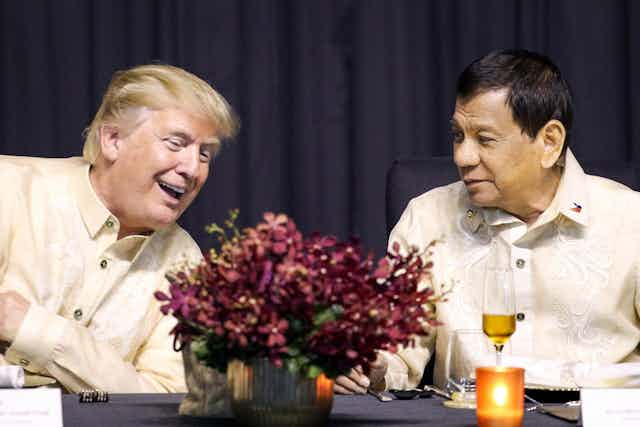Not since the grim Marcos era have Western commentators been so interested in the Philippines. Their focus is the country’s brutal and boorish president, Rodrigo Duterte, whose gruesome anti-drug campaign – death toll: 20,000+ so far – should be condemned by any rational, humane person.
But some of these Western critics ignore or understate the role of Western policy in helping to create the conditions that birthed “Dutertismo”. They have also simplified Duterte’s erratic policy gestures and not held the Western powers to the same moral standards they expect of his regime.
In his book Duterte Harry, Jonathan Miller acknowledges that poverty and inequality contributed to the popular disaffection that won Duterte the 2016 election. But Miller’s one-sided view that most Filipinos are “pro-American” and his preference for a “global trade” system that disproportionately benefits Western economies, may explain why Miller does not address a key material cause of Dutertismo.
As Walden Bello asserts in his foreword to my book The Realm of the Punisher, the US-dominated World Bank and IMF plunged the Philippines in the 1980s and 1990s into extreme debt and “massive poverty” by imposing on the country neoliberal trade, industry, land and spending reforms.
Over subsequent decades, this “neoliberal disarmament” caused the Philippines to lag behind most of its neighbours in terms of poverty reduction and annual average growth rate. The mushrooming debt burden resulted in acute under-investment in infrastructure and human services. Alienated from this political order, millions of Filipinos voted for Duterte’s problematic populism.
US imperialism
While the Financial Times’ Michael Peel suggests that another reason for Duterte’s ascent was his “mining of a seam of anti-US sentiment”, Peel only briefly – and uncritically – mentions acts of American imperialism. By contrast, Neferti X.M. Tadiar and Dylan Rodriguez are more emphatic about how a century of US state violence, exploitation and “global white supremacy” has shaped modern Philippine attitudes.
In the Filipino-American War (1899-1902), which killed up to 1.4m people, the US first used tactics such as waterboarding captives and murdering civilians under the pretext of “humanitarian intervention”.
After World War II, Washington then sponsored successive Philippine tyrants – Marcos included – who jailed, tortured and liquidated opponents. Until the 1990s, there were regular protests against US troops stationed in the Philippines. The US’s profiting from Philippine migrant labour has also long been damaging to national prosperity and social cohesion.
A concomitant of such indifference to American abuses is anxiety about the Philippines “pivoting” towards other powers. The Guardian’s Tom Smith laments that Duterte’s closer ties with China constitute a “surrender of the US alliance … [not] in the better interests of the Filipino people”.
But the reality is more complex. Although it is true that Manila and Beijing are together exploring energy reserves, and Chinese investment in the Philippines has surged since 2016, the Trump-loving Duterte isn’t as anti-American as his spiel implies. The US remains the Philippines’ second trading partner with exports to the US rising on his watch. Military activities between the two states are also expanding and Duterte has permitted the building of new American military facilities in the Philippines.
At any rate, Duterte is not the first Philippine leader to maintain relations with the US while making overtures to China. Marcos did so in 1967 and, in 1997, Gloria Macapagal-Arroyo allowed a Chinese navy ship to enter Manila.
Supposing Western fears about a realignment with Beijing are well-founded, they are nonetheless driven by a hypocritical assumption that China is a unique threat to Asian peace. Although Beijing’s construction of military facilities in the South China Sea is provocative, it is minor compared to the Pacific cordon of 400 American bases, some equipped with nuclear missiles.

Unlike China, US armed forces are operating in 17 Asian countries including the Philippines, the official justification being the “War on Terror”. But Tadiar perceives the real agenda to be the “imposition of global martial law” to guarantee the obedience of “crony states” like the Philippines to “US hegemony”.
Hypocrisy
Hypocrisy also distorts the moral calculus these Western writers apply to Duterte, encapsulated in Noam Chomsky’s aphorism: “When they do it, it’s a crime. When we do it, it’s not.” Smith’s claim that Duterte is “more of a threat to the world” than Trump is therefore dubious.
While Duterte has slaughtered 20,000 Filipinos, he is incapable of attacking people beyond his own borders, whereas US wars have killed up to 4m in the Middle East alone since 1990.
Duterte’s surly jibes about the Iraq debacle and US police shootings of African-Americans have rightly been called out as cynical “whataboutism” designed to rebuff scrutiny of his own atrocities. But that there is truth to these allegations hamstrings the West’s attempt to take the moral high ground over him.
A practical outcome of this could be to undermine efforts to arraign Duterte at the International Criminal Court, which UN delegates have censured for its double standards regarding First and Third World state crimes.
For the practical and ethical goal of world peace and human rights, we must be consistent in opposing all orchestrated violence, whether committed, enabled or supported by the elites of Western or non-Western nations. Duterte must be brought to justice – as should all other offenders, wherever they are.

